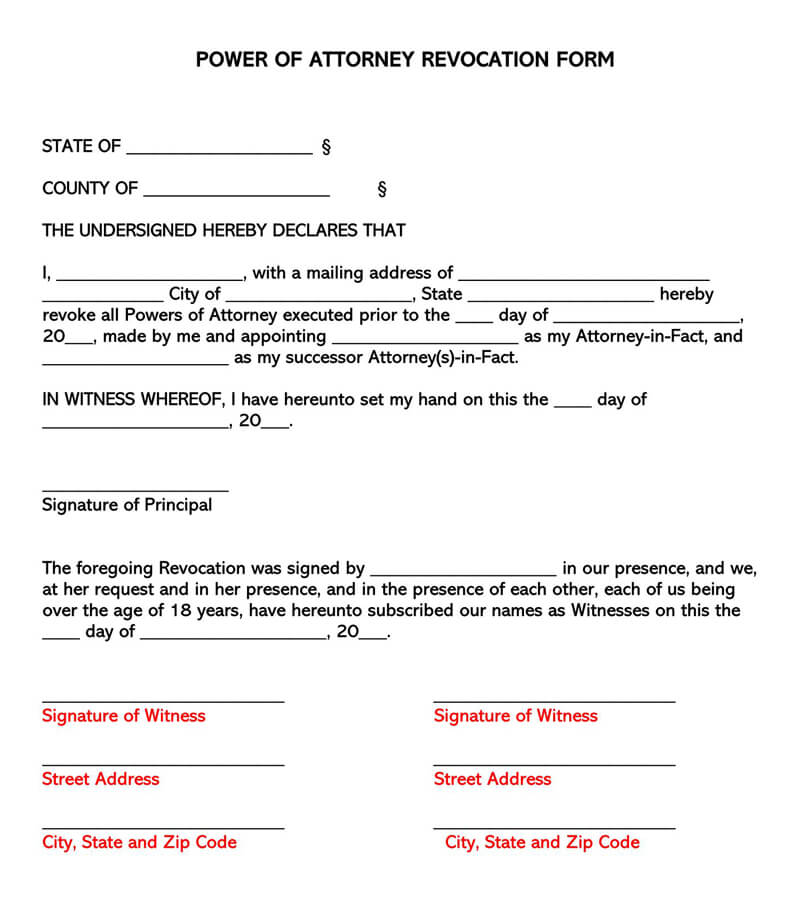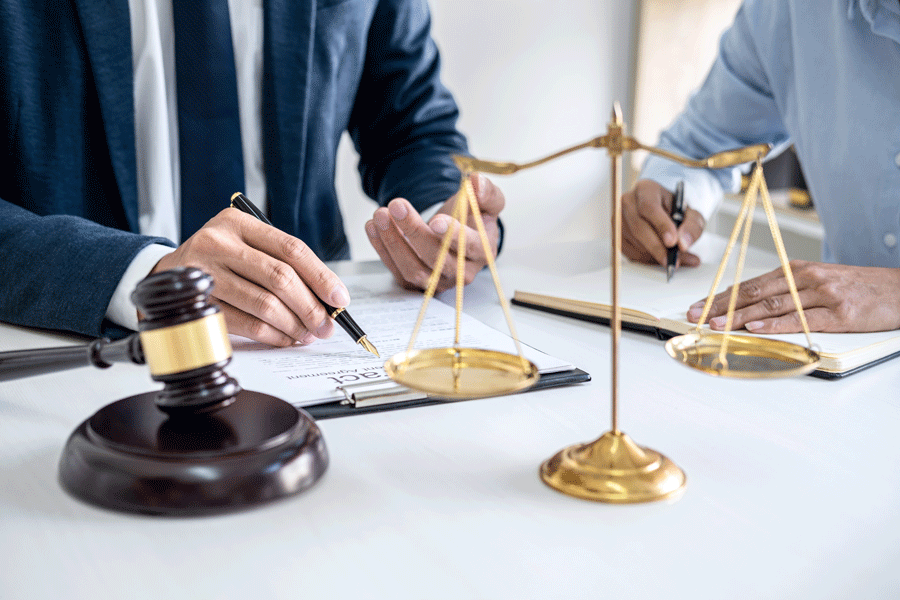The power of attorney revocation form is a document that lets a person put an end to an earlier delegated power. Once signed, this form straight away terminates the rights and responsibilities which were handed to a third party in the original power of attorney document. Technically;
The Power of Attorney Revocation Form also referred to as a Revocation of POA, is a legal document that revokes or cancels a Power of Attorney.
Revocation of Power of attorney is a written confirmation that the Principal, i.e., the person who appointed the POA, wished to revoke or cancel the POA and no longer wished that the individual appointed to act on their behalf. Just as the Principal can Create a POA, they also have the power to revoke the POA.
A Revocation POA should generally identify:
- The Agent previously granted the POA
- The effective date/period of revocation of the POA
Understanding Power of Attorney Revocation
The Principal is usually the only person with the right to terminate the POA appointment. However, suppose the Principal’s family feels that the appointed Agent abuses the powers granted to them. In that case, the family may decide to take the matter to a family court in the respective state where the appointment was made to have the POA revoked.
Basic revocation elements
If the Principal wishes to revoke the POA, they will first need to fill out the revocation form. The form will identify the following:
- The former Agent: The name of the person previously appointed to act on the Principal’s behalf.
- Principal: The name of the person who granted the POA
- Effective date: The effective date/period of the revocation of the POA
- Signature: The Principal’s and Notary’s Signature
How POA Revocation works
The power acts to reverse an earlier decision that was made with regard to delegating some duties and responsibilities. A form is filled which expressly puts an end to an earlier agreement or delegation of power. This form is signed in the presence of some witnesses and preferably before a notary public.
Several copies are then made and handed to the signatories to the previous agreement. This is to notify the parties of the change of heart and of the new intent. The previous agreement ceases to take effect the moment the revocation is signed and dated.
When to revoke the POA
There are various reasons why the Principal may want to cancel the Power of Attorney. Some of the reason include:
- If the POA is not needed anymore: If the POA was initially created to serve a specific purpose which has been fulfilled or if the Principal is now able to act for themselves and now no longer need the Agent appointed the POA, they may choose to cancel it, to prevent the Agent from acting on their behalf.
- If the appointed attorney is not fit to do their job: In that case, if it comes to the Principal’s attention that the appointed attorney is careless or untrustworthy, they may opt to cancel the POA and appoint another agent to represent them instead.
- If the appointed attorney can no longer act: For example, if the appointed attorney becomes sick or moves to another country/state, it may not be possible for them to continue acting on behalf of the Principal.
- If the principal wishes to appoint the POA to someone else: The Principal has the power to invoke and revoke the POA. For instance, if the appointed Agent passes away or the Principal named their spouse as their attorney and divorce, they will have to appoint a new agent to handle their affairs.
- Change in relationships- In case your agent is a spouse whom you end up divorcing, you might have to revoke the power as it might not be possible for the said person to carry out crucial decisions and undertakings on your behalf. In this case, you might want to bring in a new member of the new spouse you marry.
- Death of a signatory- If it so happens that one of the signatories to the previous ‘power of attorney’ passes on, you will have to revoke the power first and foremost before writing a new one in its stead. In this case, you have to assign someone else in the place of the one you had earlier.
- Unavailability- Lastly, it may also be that the person whom you selected to be an agent may not be available to transact the business on your behalf. If this is the case, you also want to find a new one who is available and assign him the role of an agent again.
Other instances that may warrant the revocation of the POA include:
- If the Principal has a bad experience with the Agent and no longer wish for them to act on their behalf
- The Principal is no longer traveling abroad and can be able to handle their affairs
- The Agent appointed to act on behalf of the Principal is no longer acting in good faith or is breaching their fiduciary duties.
- The Principal has returned from being deployed overseas as military personnel.
According to a November 2012 report by the US GAO- Government Accountability Office, older adults are more prone to financial exploitation by ill-meaning POA agents. Luckily, one can use the POA revocation form to help them revoke the powers they had initially granted to an ill-minded agent.
What makes the POA revocation valid?
It is not just enough for the Principal to call or email their Agent and inform them that they have revokes their POA. To make the revocation valid, the Principal must:
- Have the POA revocation witnessed and signed by a notary
- Provide their Agent with the revocation of their POA and have them return any copies of the initial POA
- Provide a copy of the revocation to any third parties. The Principal has approved the Agent to represent them on, e.g., banks, insurance companies, etc.
- Provide a copy of the revocation to the agency where the POA was initially recorded, such as the County Clerk or Land Titles office.
Revoking the Power of Attorney
There are three main steps involved in revoking the POA that one should know about when looking to revoke a POA appointment.
- Completing the POA revocation form- The Principal should download and complete the form and fill it accordingly. It is important that when completing the revocation form, they go through the original POA form to ensure that they capture all the information, such as the date and name of the Agent, correctly.
- Execution- The next thing to do is sign the form as was initially signed in the original POA. It is recommended that one seeks the help of a notary public to officiate the document.
- Sending the revocation- After going through the document and ensuring that the information included in it is correct, the Principal should send the document via certified mail and retain a copy for future reference.
Power of Attorney Revocation Forms (by State)
Free Power of Attorney Revocation Form

Consequences of Not Revoking the POA
It is important for the Principal to cancel their previous Agent’s POA since having the wrong Agent representing them in important financial and business decisions.
By taking time to revoke the POA, the Principal can prevent the following:
- The lost opportunity cost of
- Trying to go after an agent who has zeroed out all the accounts
- Resolving financial and legal mess caused by a careless or untrustworthy agent
- Looking for a more responsible and trustworthy agent to take charge of the financial and legal matters
- Expensive layers fees to
- Recover money unauthorizedly withdrawn from the Principal’s accounts by the Agent
- Dispute unauthorized transactions by the previously appointed Agent
- Mental anguish from
- Being scammed by the agents, losing your house, or having your life savings embezzled by the Agent
- Losing control of your business
- Experiencing a breach of trust by the Agent who abused their POA
Frequently Asked Questions
No, a POA has to be revoked in writing to have tangible evidence of the revocation. The revocation may be presented to third parties as proof that the POA was revoked and the Agent previously granted POA is no longer authorized to act on the Principal’s behalf.
You do not require a lawyer to revoke a ‘power of attorney.’ This is a task you can conveniently and comfortably do as long as you are mentally competent. Even though a lawyer is not really necessary, you will find the intervention of a lawyer suitable to comprehend those terms and conditions which are too complex for a novice to understand. A lawyer also comes in when notarizing the document.
Ordinary POAs have usually terminated automatically if the Principal is incompetent, i.e., if they are incapacitated and not capable of making sound decisions. However, durable POAs will remain in effect even if the Principal is mentally incapacitated.
No. the attorney-in-fact may not revoke another attorney-in-fact powers even if they have the authority to make legal decisions without consulting the other attorney-in-fact. Only the Principal can revoke the POA since they are the ones who have granted the POA, and the Attorney-in-fact cannot invalidate their wishes.
Key Takeaways
Unless the POA is revoked correctly, the Agent can continue to act on behalf of the Principal legally. To cancel the POA, the Principal can create a Revocation of POA document or draft a new POA stating that the initial POA has been revoked. As the Principal, you can decide to rescind the POA at any time, even if the POA has a specified end date, as long as you are competent and the Agent is duly notified. Consequently, any third party that the Agent had been previously approved to deal with should be notified of such revocations.












